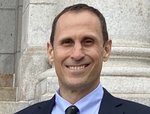

Everyone has a voice. But not every voice gets heard today. This isn't a new problem.
My grandma and grandpa on my dad's side were both first-generation Mexican-Americans who grew up in Los Angeles in the early 20th century and spoke Spanish. To avoid discrimination, they did not always speak Spanish in public since some people treated Spanish speakers as second-class citizens and perpetuated stereotypes that those who spoke Spanish were lazy, uneducated, and undeserving.
As my grandparents grew older, they no longer had to hide their Latino heritage. My grandpa became a successful barber and business owner, and my grandma was a high school Spanish teacher for 15 years.
I am a third-generation Mexican-American and have never experienced discrimination firsthand. Still, the history of discrimination against immigrants in the United States continues. With more than 45 million American residents who are immigrants, we have more immigrants than any other country in the world. We also have an opportunity to change the narrative.
This change can start in our own communities. According to the U.S. Census, there are 366,300 immigrants living in Minneapolis-St. Paul, or 10 percent of the 3 million people in the Twin Cities. More than 3,000 people are experiencing homelessness in Hennepin County. The numbers could be growing.
The Star Tribune reports that "one-third of 452 families in homeless shelters run by Hennepin County are newcomers to the United States, as a surge of migrants cross the southern border. Others are being turned away as Hennepin County's system grows so overwhelmed that it is failing to follow its longstanding policy to shelter every homeless family with children. The number of sheltered families has doubled since this summer to nearly four times the county's regular capacity — the highest in at least a decade."
Most of the migrants are Ecuadorians seeking asylum. Minnesota's immigration court has 7,779 Ecuadorians with pending cases, up from 344 in 2018. Their court dates are months or years away. While many Ecuadorian asylum-seekers are not homeless, they turn to shelters when their own networks can't help. Now the county has more than 1,500 people in family shelters and is looking for new rooms daily.
We need short- and long-term solutions. The Minneapolis Office of Immigrant and Refugee Affairs (OIRA) is doing all it can to provide them. Started in 2018 and led by Michelle Rivero, a longtime immigration lawyer, the office advises the city on immigration issues, welcomes new immigrants, connects residents to resources and legal help, highlights the contributions of immigrants in our community, and hosts a monthly public forum to give immigration-related updates to the community.
"We’re stronger when we’re welcoming our immigrant communities," Rivero told MinnPost in 2018 when she started the job.
Five years later, she has made tremendous progress with the Office of Immigrant and Refugee Affairs to develop support programs for foreign-born residents and make Minneapolis more welcoming for immigrants.
They still could use more help to create solutions and ensure all basic needs are met.
Colder temperatures are coming, and migrants need winter clothes and shoes. Some arrived with only Crocs.
We need new policies. Asylum-seekers have to wait six months after they file their asylum application to apply for legal permission to work. Even if they have the skills and desire to work, they can't do it legally for months.
We are at the point of the human story where we need to confirm our humanity. Then, we can strengthen our humanity.
Instead of blaming foreigners for threatening economic prosperity in the U.S., consider how they could help grow our economy. Let's fill the needs with a positive approach and growth mindset. We can do this through empathy, compassion, kindness, generosity, and creativity.
Changing laws and policies take time. Being empathetic, compassionate, and kind is instantaneous. We need to be proactive and create solutions in Minneapolis before the temperatures really drop, and people are not equipped to deal with the elements.
Until we can develop permanent solutions to homelessness, we need to create temporary housing solutions. Where are empty, usable buildings that could house some people? Could we put up a temporary housing structure (say a big heated tent) in a large, open-air area? Could a program provide emergency rent until people can work and cover rent themselves?
The immigration issues facing us are of human origin. They require humane solutions. We must confront these challenges together — with love, respect, and integrity — to clean up the obstacles we have created.
We have a rich community of immigrants and unhoused neighbors. Helping them will help us. What can we do for other people? How can we exemplify the ideals of service? How can we represent the best of us?
It's time to flex our humanity.
To learn more about the Minneapolis Office of Immigrant and Refugee Affairs and help create solutions in our communities, email oira@minneapolismn.gov or call 612-394-6018.
Eric Ortiz lives in the Wedge with his family. When he’s not community building, he’s the chief content officer for the Strong Mind Strong Body Foundation and writes bilingual children’s books with his kids. Their first book, “How the Zookalex Saved the Village,” is available in English and Spanish.
Comments
No comments on this item Please log in to comment by clicking here